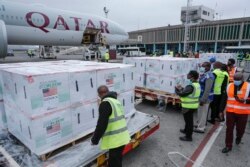The United States on Thursday marked the successful distribution of 200 million COVID-19 vaccines to more than 100 countries, a move the White House says fulfills President Joe Biden's vow to become "the world's arsenal of vaccines."
White House deputy press secretary Karine Jean-Pierre said this is just the start. In September, Biden announced plans to donate more than 1 billion vaccines to low- and lower-middle-income nations.
"Donating vaccines is one urgent effort we are taking to tackle this pandemic globally, and we've committed to donate 1.2 billion (vaccines), along with lifesaving assistance to countries in need to enhance their ability to get shots into arms," she said Thursday. "We also reiterate support for an intellectual property waiver and bolstering manufacturing here at home and abroad."
The U.S. Agency for International Development said it is also working to help provide nations in need with related items and support such as testing, treatment and protective equipment.
"Americans have 200 million reasons to be proud," read a statement from USAID Administrator Samantha Power. "USAID is honored to be at the forefront of this global vaccination effort unprecedented in scale, speed, and complexity, to counter the worst pandemic in modern history."
Those donations have come rapid-fire in a matter of months, with large tranches going out recently to lower-income nations. Last week, the White House announced it was donating 17 million doses of the one-shot Johnson & Johnson vaccine to the African Union, bringing the total donation to the 55-state body to 50 million doses.
But critics note that beating the pandemic is far from a fait accompli.
"The U.S. is far and above the leader in global vaccination efforts, and these doses are helping save lives and stop the spread of COVID," said Sarah Swinehart, senior communications director at the ONE Campaign, an anti-poverty group.
"But if the vaccine isn't everywhere, this pandemic isn't going anywhere," she said. "Only 16% of the doses pledged by G-7 countries have been delivered. Wealthy countries must step up and show urgency to get these doses out the door and into arms."
And even as donations have increased, the White House has faced criticism over its push for already vaccinated Americans to receive boosters when many people across the globe have yet to receive a single dose. Administration officials dismissed it as a false choice, saying they can protect the already vaccinated U.S. population while also sharing with the world.
On Wednesday, theFood and Drug Administration authorized the use of booster shots for those who received the Moderna and Johnson & Johnson vaccines — a move that Tom Hart, acting CEO of the ONE Campaign, said could imperil the Biden administration's ambitious donation goals. The group noted that as of this week, 84% of the vaccine doses promised to low- and lower-middle-income countries have not been delivered.
"While some argue that we can both administer boosters and vaccinate the world, the simple fact is that boosters divert supply from an urgent area of need — administering first shots around the world," Hart said. "Wealthy countries are already woefully off track in delivering the vaccines they have promised to share to date, and it will take significant ambition, funding, and speed to reach the goal of 70 percent of the world by September 2022."
Globally, the coronavirus has killed 4.9 million people in under two years, according to World Health Organization data.
At the height of the AIDS pandemic, in the years 2005 and 2006, just under 2 million people died of that virus each year.





